In an age where processed foods are the norm, there’s a quiet revolution brewing in the world of nutrition – the whole foods-based vegan diet. This approach isn’t just about eliminating animal products; it’s about embracing foods in their most natural state. It’s a journey back to the basics, where the simplicity of nature’s bounty meets the complexities of our nutritional needs. In this comprehensive guide, we’ll explore the what, why, and how of adopting a whole foods-based vegan lifestyle.
Embracing Nature’s Bounty: The Whole Foods-Based Vegan Diet
Understanding a Whole Foods-Based Vegan Diet
A whole foods-based vegan diet is grounded in plant-derived foods that are unprocessed and unrefined, or processed and refined as little as possible. This diet includes fruits, vegetables, nuts, seeds, grains, and legumes, and excludes or minimizes meat, dairy products, eggs, and highly processed foods like bleached flour, refined sugar, and oil.
The distinction between this and a standard vegan diet lies in its emphasis on whole foods. While a vegan diet simply avoids animal products, a whole foods-based approach takes things a step further by focusing on the quality and processing of plant foods. This approach champions the nutritional integrity of the food, ensuring a rich supply of vitamins, minerals, and other essential nutrients.
Health Benefits
The health benefits of a whole foods-based vegan diet are manifold. Numerous studies have shown that such a diet can lead to weight loss, improved heart health, and lower risks of chronic diseases like diabetes, hypertension, and certain cancers. The high fiber content in whole plant foods improves digestion and aids in maintaining a healthy gut microbiome.

Moreover, this diet is rich in antioxidants and anti-inflammatory compounds, which combat oxidative stress and inflammation in the body – two key drivers of chronic diseases. By emphasizing foods like berries, leafy greens, nuts, and seeds, this diet provides a plethora of nutrients essential for maintaining optimal health.
Additionally, this diet tends to be lower in calories but higher in volume and nutrients, leading to increased satiety and reduced calorie intake, which aids in weight management and obesity prevention.
Environmental Impact
Adopting a whole foods-based vegan diet isn’t just beneficial for your health; it also has profound environmental implications. This diet reduces the strain on environmental resources, as plant-based foods generally require less water, land, and energy to produce compared to animal-based foods. It also leads to lower greenhouse gas emissions, helping combat climate change.
Moreover, a whole foods approach minimizes food waste, as it encourages the consumption of the entire food item and supports more sustainable farming practices. For instance, eating a whole apple, including the peel, not only provides more nutrients but also reduces waste.
Transitioning to a Whole Foods-Based Diet
Transitioning to a whole foods-based vegan diet can be a delightful adventure. Start by gradually incorporating more whole plant foods into your meals. Focus on adding, rather than subtracting from your diet. Try new fruits, vegetables, whole grains, and legumes each week. Experiment with herbs and spices to add flavor without the need for processed ingredients.
Planning is key – think about your meals for the week and make a grocery list accordingly. When shopping, stick to the outer aisles of the grocery store as much as possible; this is typically where the whole foods are located.
It’s also crucial to read labels carefully. Even products labeled as ‘vegan’ can be highly processed. Look for foods with minimal ingredients, all of which you can recognize and pronounce.

Overcoming Challenges
The journey to a whole foods-based vegan diet isn’t without its challenges. Availability and cost can be hurdles. However, buying in bulk, choosing seasonal produce, and opting for local farmers’ markets can make this diet as economical as it is nutritious.
Variety is another concern. Keep meals interesting by trying international cuisines that naturally emphasize whole plant foods, like Mediterranean, Indian, or Ethiopian. These cuisines offer a wealth of delicious and diverse vegan dishes that are rich in whole foods.
Sustaining the Diet Long-Term
Sustaining a whole foods-based vegan diet long-term requires a blend of commitment, creativity, and community. Stay informed and inspired by reading books, watching documentaries, and following health and nutrition blogs. Connect with like-minded individuals through social media groups, local meetups, or vegan cooking classes. This sense of community can provide invaluable support and inspiration.
Remember, it’s about progress, not perfection. Don’t be too hard on yourself if you occasionally consume processed foods. The goal is to make whole foods the core of your diet.
Case Studies and Success Stories
Inspiration abounds in the stories of those who’ve embraced this diet. Take, for instance, John and Jane Doe, a couple who switched to a whole foods-based vegan diet two years ago. They’ve since experienced significant improvements in their energy levels, weight management, and overall health. Their journey, shared on their blog, highlights the transformative power of this diet.

Conclusion
The whole foods-based vegan diet is more than a dietary choice; it’s a lifestyle commitment to health, environmental sustainability, and ethical consumption. By embracing nature’s bounty in its purest form, we not only nourish our bodies but also contribute to a healthier planet.
Also read: Nutrition for Eye Health: What to Eat for Good Vision
